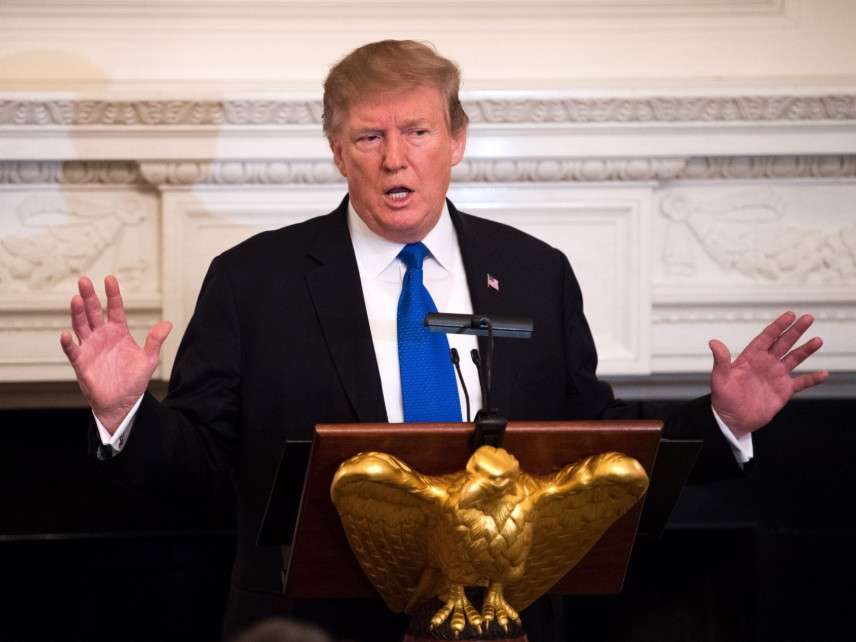Trump's Emergency Declaration May Be Legal, but It's an Affront to the Constitution Anyway
It's an attempt to make an end-run around congressional spending authority.

Today, the House is set to vote on a resolution, drafted by Democrats, to overturn President Trump's declaration of a national emergency at the southern border, which Trump put in place after Congress declined to provide $5.7 billion for the construction of hundreds of miles of border wall. The House vote will force the Senate to weigh in on the measure.
Trump has framed the dispute as an argument about border security. He wants a wall, but Congress won't fund it. Yet in many ways, the border wall itself is a secondary issue. This is a constitutional conflict between co-equal branches of government over the nature of the relationship between the executive and the legislature.
To understand what's at stake in these votes, it's worth going back several years to a dispute between House Republicans and the Obama administration over the funding of Obamacare.
That part of the health law called for a series of subsidies to be paid to health insurers. Known as cost-sharing reduction subsidies, these payments were worth billions of dollars each year. But although the law called for these payments to be made, it did not designate any source of funds from which to do so. For that, Congress would need to make an appropriation.
In 2014, the Obama administration's budget requested that appropriation, seemingly acknowledging that an appropriation was necessary. Congress, however, declined to provide it.
The Obama administration decided to pay the subsidies anyway. And House Republicans, in turn, decided to sue. The particulars of the legal argument delved into questions of standing and whether the text of the Affordable Care Act had tacitly created a permanent appropriation to fund the law's tax credits and subsidies. Obamacare proponents argued that there would be negative consequences for the functioning of the law if the subsidies were cut off.
But although the health law was the proximate issue, the core of the case revolved around a larger constitutional question: Can the executive spend money that the legislature has not explicitly appropriated? The House GOP's position was simple: Only Congress has the power of the purse.
In May of 2016, a federal judge sided with the House. "Congress is the only source for such an appropriation, and no public money can be spent without one," wrote U.S. District Court Judge Rosemary Collyer. At the time, Republicans hailed the decision as a victory for bedrock constitutional principles. Then-Speaker of the House Paul Ryan said the court showed that the Obama administration "overreached by spending taxpayer money without approval from the people's representatives." House Ways and Means Committee Chairman Kevin Brady called Collyer's ruling "a critical step in protecting Congress' power of the purse from an administration that has repeatedly ignored a fundamental principle of our Republic: the separation of powers."
Collyer stayed the decision pending appeal, and the Obama administration kept making the subsidy payments. After the 2016 presidential election, the Trump White House initially did too. But in October 2017, the administration ended the payments, citing the court ruling that the payments "were not lawful."
The details of the debate over Trump's border wall are obviously different. The legal requirements for declaring a state of emergency are sufficiently vague that one can mount a plausible argument that Trump's move is at least tenuously legal. (Although law professor Ilya Somin, writing at The Volokh Conspiracy, makes a strong case that it is not, since the point of a national emergency is to allow the president to respond in the event of a sudden crisis, and whatever your opinion of what's happening at the border, it's not a sudden event.)
But the fundamentals of the dispute are the same: Trump asked Congress for money to fund a presidential priority. Congress declined. And by declaring a state of emergency, Trump is making an end run around Congress in order to spend money that the president is not authorized to spend. Trump's move may or may not be technically unconstitutional, but it is certainly anti-constitutional, a presidential action intended to flout the framers' design.
A handful of Republican lawmakers have offered principled objections to Trump's emergency order, but Republican leaders in Congress have supported the president's move and attempted to quell dissent amongst GOP lawmakers. In doing so, they not only undermine the co-equal authority of their own branch of government, they signal their willingness to back an affront to America's constitutional order in service of cynical partisan gain.


Show Comments (265)